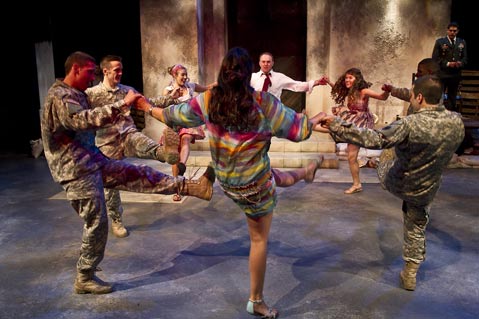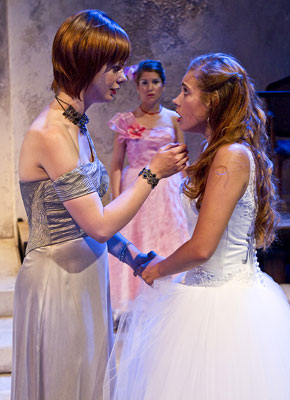Iphigenia 2.0
Charles Mee’s Modern Tragedy at UCSB

In 410 BCE, the Greek playwright Euripides wrote Iphigenia in Aulis, a tale of political pressure, deception, and murder. Like network soap operas of today, the play had all the human drama critical to keeping an audience glued to the story: sex, violence, and innocence betrayed.
In his 21st-century rendition of Euripides’ classic tragedy, playwright Charles L. Mee doesn’t have to work too hard to find modern parallels: the questionable motives of our military machine, the complacency of those who do not serve on the front line, and the frenetic mash-up of fashion, music, entertainment, and social rituals that make up our modern culture.
From the outset, an already distraught Agamemnon (Sean Harrigan) lays it out plainly: “We see from the histories of empires / none will last forever / and all are brought down finally / not by others / but by themselves.” And so, though Mee’s version involves no gods toying with human affairs, this drama unfolds beneath the weight of impending catastrophe.

There are the soldiers—a cast of four ruddy-cheeked young men who salute their leader and perform jumping jacks and push-ups in unison. Their demands of their leader are simple: porn magazines, Oreo cookies, and “some sense of commitment.” In order to demonstrate that his dedication matches their willingness to risk their own lives, the soldiers have asked Agamemnon to sacrifice his daughter, the lovely Iphigenia (Alexia Dox).
When she arrives home, lured by the promise of marriage to Achilles (Josh Domingo), Iphigenia turns out to be a squealing valley girl, filled with dreams of bachelorette parties at Beverly Hills hotels and a luxurious honeymoon in the Caribbean. Her girlfriends indulge her fantasies while her father tries to backpedal on his horrifying commitment and her mother, the imposing Clytemnestra (played by a regal Annabelle Rollison), begins to catch wind of Agamemnon’s ugly plot.
Under Tom Whitaker’s direction, the production maintains many of the formal structures of Greek tragedy—the chorus often speaks and moves as a single entity, while Agamemnon’s musings on morality are directed at the audience, oratory style. Yet the young cast also taps into contemporary references. Thanks to Christopher Pilafian’s brilliant choreography, the bridesmaids share a striptease-inspired dance in pink stilettos; the soldiers break into hip-hop routines to LL Cool J’s “Mama Said Knock You Out.”
Ultimately, Iphigenia’s 21st-century self-sacrifice is horrifying because of what it’s built on: a life devoid of real meaning and her sense of what such an act will buy her—a chance to be “more than famous.” “What teenage magazines have you been reading?” her mother screams as a last resort. “What crap?” It’s one of many serious challenges this play levies at its audience.



